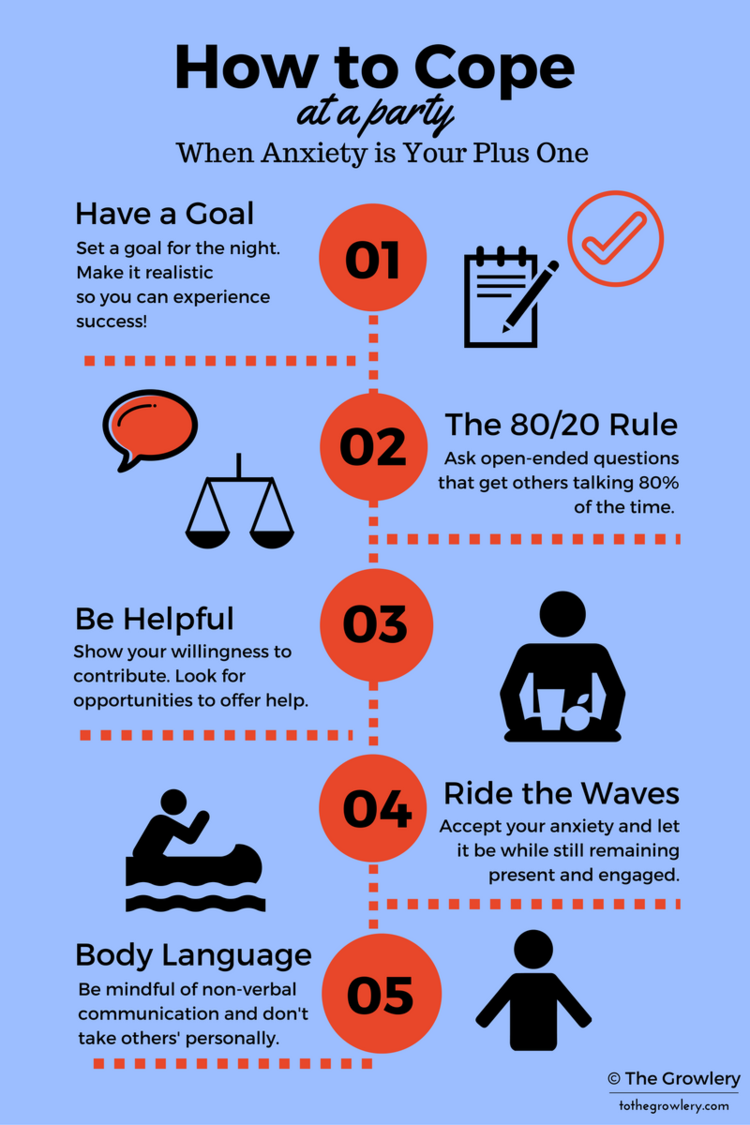How to Cope at a Party When Anxiety is Your Plus One
Being invited to a social gathering when you have anxiety can be a nightmare. Who will be there? What should I bring? What do I say? What if no one talks to me? What if someone does talk to me? Whether you are meeting your significant others' friends for the first time, attending a work party, or just getting together with a group of friends, having a plan for coping with your anxiety is essential to surviving.
Have a Goal.
Entering a social gathering with no idea of what you want to accomplish will make it extremely difficult to feel like you have succeeded at the party. Your evening needs to be a series of predictable, small successes. Start small, and make sure your goals are specific enough for you to tell whether or not you have achieved them. Identify goals that seem realistic for you based on your personality, your strengths & challenges, and the type of party you are attending. Meeting two new people and learning one fact about each of them may be possible at a small gathering of ten people, but learning everyone's names and making a new best friend at a huge house party may not.
The 80/20 Rule.
This rule comes from time management and productivity but can be applied to many concepts to help you achieve balance in your life. The idea is to balance the amount of energy and focus you place on yourself in the conversation with allowing space for the other person as well. For example, you may share a small detail about how you know the person at the party and then ask an open-ended question about their connection to the host. This shows the other person that you are interested in getting to know them and what they have to say. In general, people appreciate others' genuine interest and it is a great way to leave a good first impression with new people. Bonus: If you have social anxiety, thinking about things to say or talk about can be paralyzing! Asking open-ended questions takes the pressure off of you to fill the conversation.
Be Helpful.
Look for opportunities to offer assistance and help to the host, or even other party guests. Can you help prepare drinks or an appetizer? Can you show a newly arrived guest where to put their coat? What about opening that bottle of wine you brought? You can even show up early and offer to help set up, which can then ease your worries about leaving early. If you aren't sure what to offer help with, you can start with an open-ended, "Is there anything I can help with?" to the host.
Ride the Waves.
Let's face it--you are not going to get rid of your social anxiety in one evening, no matter how successful things go. Accept that your anxiety is tagging along as your plus one and allow it to be there, though quietly in the background. You can use mindfulness skills to help you stay grounded in the present even while the anxiety persists--notice and take in the details of your surroundings, focus on the words that others are saying and what seems important to them in life, practice taking slow deep breaths and focusing on the movement and sensations it makes in your body. Take a break if you need to: go to the bathroom, text a friend, offer to run to the store to get something that is needed (but don't forget to come back!)
Body Language.
Otherwise known as your "non-verbals", this includes what you are communicating to others with your facial expressions, posture, gestures, and tone of voice. If you are standing with your arms crossed against a wall, you aren't exactly giving the impression that you are interested and open to getting to know others. Try standing with a relaxed, open posture, and holding a resting, pleasant half-smile on your face. Make eye contact if it feels comfortable, nod your head when someone is talking, say "mm-hmm" even if the conversation isn't directed at you, and place yourself in an area where you can be easily approached or engage with others.
These steps can help you at any level of social anxiety--even seasoned pros can still experience anxiety before a party and find these strategies helpful. You don't have to accomplish all of these in one night, but set a small goal for yourself to try one or two and see if they help. There will always be a next time to try again!

